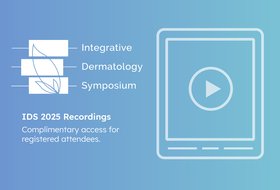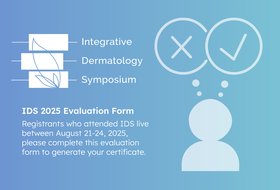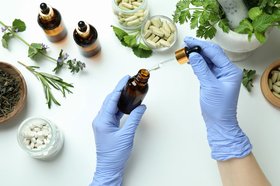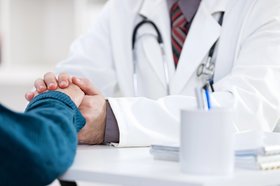Learn
Delve into dermatology diseases with new approaches from conventional to complementary care.
Topics
Explore a broad spectrum of dermatological conditions and topics to enhance your practice.
Training Programs
Expert led instruction for every level of patient care.
Log in to see enrolled program content.
Conferences
Gain practical insights and meet new colleagues.
Hover over a conference to view recordings.
Join Us
The largest integrative dermatology community.

Mindfulness
Faculty: Jessica Maloh
This session reviews the science behind mindfulness and how mindfulness-based stress reduction programs can be utilized in clinical practice. Research on mindfulness-based stress reduction programs for dermatological conditions is discussed. An introduction to acupressure for stress relief is included as well.
Learning Objectives:
- Understand what mindfulness is and the background behind mindfulness based stress reduction (MBSR) programs.
- Evaluate the research for MBSR programs for dermatological conditions including atopic dermatitis, alopecia aereata, .
- Review some basic acupressure points used for stress reduction.
Functional Testing Background and Practical Application
Faculty: Jessica Maloh and Raja Sivamani, MD MS AP
This course reviews the background behind food allergy, heavy metal, organic acid, and cortisol testing. Evaluation of their practical use when trating dermatological conditions will be discussed.
Learning Objectives:
- Review food allergy testing and its clinical relevance in dermatological conditions.
- Summarize the use of heavy metal testing for dermatological conditions, the prevalence of heavy metals in skincare products, and the use of chelation therapy.
- Review the background and markers involved in organic acid and salivary cortisol testing.
Functional Medicine Testing Practical Application: OAT and DUTCH Testing
Faculty: Julie Greenberg, ND
Functional medicine aims to find and treat the root cause of disease by treating the whole person. There is a plethora of functional medicine tests to help practitioners achieve these goals, including two urinary metabolite tests: the Organic Acid Test (OAT) and the DUTCH hormone test. This session will familiarize practitioners with the fundamentals of each test for the purpose of interpreting test results and creating comprehensive treatment plans.
Learning Objectives:
- Explain the goals of functional medicine
- List which dermatological conditions the DUTCH test could be helpful for to illuminate the root cause of disease
- Describe which markers on the Organic Acid Test (OAT) are most useful for assessing gut microbiome dysfunction
Gut Microbiome Testing and Cases: 16s, qPCR, and Whole-Genome Sequencing and Probiotics, Prebiotics, and Postbiotics: Science and Evidence
Faculty: Raja Sivamani, MD MS AP This session covers the different types of microbiome testing technology including 16s, qPCR, and whole-genome sequencing. The science behind probiotics, prebiotics, and postbiotics is discussed. Learning Objectives:
- Understand the science behind gut microbiome testing
- Compare and contrast each type of microbiome testing technology including, 16s, qPCR, and whole-genome sequencing.
- Review the literature on prebiotics, probiotics, and postbiotics and evaluate their use for dermatological conditions.
Intravenous Nutrient Therapy and Intramuscular Injections
Faculty: Jessica Maloh
This session reviews the most common nutrients used for intravenous (IV) and intramuscular (IM) therapies. The research for their clinical application is discussed.
Learning Objectives:
- Understand the different benefits of intravenous and intramuscular injection therapies.
- Review the nutrients utilized for IV therapy formulations and IM injections.
- Evaluate the current research on the use of IV and IM therapies for dermatological conditions.
Fotona Laser Demo
Faculty: Raja Sivamani, MD MS AP
This session provides a demo of the Fotana laser device and reviews its clinical applications.
Learning Objectives:
- Observe a Fotona laser demonstration.
- Review the safety and efficacy of the Fotona laser device.
- Understand the clinical applications of the Fotona laser.
Palpation-Based Acupuncture meets Dermatology
Faculty: David Euler, LAc
In this presentation David Euler will talk about the constitutional treatments that are necessary to consider when engaging a patient with chronic, hard-to-treat skin conditions. David will present and demonstrate the differential diagnosis and treatment strategies for immune system imbalances, adrenal gland exhaustion, and autonomic nervous system imbalance.
Learning Objectives:
- Name the key constitutional conditions considered in the treatment of chronic skin conditions.
- Make the differential diagnosis by Palpation for “Oketsu” and liver problems, immune system imbalance, sympathetic nervous system dominance, and Adrenal gland exhaustion.
- Name the main acupuncture points for the treatments of the imbalance of the immune system, liver, adrenal gland, and sympathetic nervous system.
Plant Oil Science, Formulation, and Customization
Faculty: Raja Sivamani, MD MS AP ; Peter Lio, MD ; Apple Bodemer, MD
This session reviews the physical properties and chemistry of different types of oils. The research behind topical oils and their use for dermatological conditions is covered as well.
Learning Objectives:
- Review the history and science of fixed vs essential oil use.
- Learn how to choose an oil for topical use.
- Evaluate the research for the use of topical oils for dermatological conditions such as acne, atopic dermatitis, and hair thinning.
Three Easy To Integrate Ayurvedic Spa Treatment Modalities
Faculty: Melanie Saches
This session will introduce Ayurveda, the ancient healing modality from India, and show how a number of its time honored techniques are useful today in the spa setting. The theory and practice of three such Ayurvedic modalities: marmani - vital energy points, Kansa Wands - bronze capped massage tools and Shirodhara - a treatment in which warm oil continuously flows over the forehead and scalp, will be discussed.
Learning Objectives:
- Review a number of key revitalizing marma points on the face, head and neck.
- Perform a massage sequence for the face using the Kansa Wand.
- Understand how to customize shirodhara treatments and discover how it is used to address client concerns in the spa, along with suggested precautions.
- Observe a shirodhara demonstration.
- Apply the ancient science of Ayurveda's simple practical techniques to efficiently address 21st-century concerns.
Herbs and Herbal Formulations
Faculty: Amy Branum and Raja Sivamani, MD MS AP
This session reviews herbal classification theory and covers the most common herbs used in herbal medicine. How to apply herbal theory when creating herbal formulations is also discussed.
Learning Objectives:
- Review herbal theory
- Review common herbs and their practical uses
- Apply herbal theory and engage in herbal formulation
Faculty

Jessica completed her BSc at York University in Toronto, ON and has completed her Doctor of Naturopathy degree from the Canadian College of Naturopathic Medicine. She believes that integrative medicine with an evidence-based approach can allow practitioners to better support patients and optimize patient care. Jessica is passionate about bridging naturopathic and conventional medicine in clinical dermatology.

Dr. Raja Sivamani is a board-certified dermatologist and practices as an integrative dermatologist at Pacific Skin Institute. He is an Adjunct Associate Professor of Clinical Dermatology at the University of California, Davis and Director of Clinical Research and the Clinical Trials Unit.He is also an Adjunct Assistant Professor in the Department of Biological Sciences at the California State University, Sacramento and an Associate Professor of Dermatology at California Northstate University, College of Medicine.He engages in clinical practice as well as both clinical and translational research that integrates bioengineering, nutrition, cosmetics, and skin biology. With training in both Allopathic and Ayurvedic medicine, he takes an integrative approach to his patients and in his research.He has published over 100 peer-reviewed research manuscripts, 10 textbook chapters, and a textbook entitled Cosmeceuticals and Active Cosmetics, 3rd Edition with a passion for expanding the evidence and boundaries of integrative medicine for skin care.

Dr. Julie Greenberg is a licensed Naturopathic Doctor (ND) and Registered Herbalist RH(AHG) who specializes in integrative dermatology. She is the founder of the Center for Integrative Dermatology, a holistic clinic that approaches skin and hair problems by finding and treating the root cause. Dr. Greenberg holds degrees from Northwestern University (BA), Stanford University (MBA) and Bastyr University (ND). Her research on the gut microbiome of acne patients has been published in a leading peer-reviewed clinical dermatology journal. While at naturopathic medical school, Dr. Greenberg received training with leading experts in dermatology at the University of Washington Medical School Dermatology Clinic and Seattle Children’s Hospital Pediatric Dermatology Clinic. She lectures at naturopathic medical schools and speaks at conferences across the U.S. on the topics of hair, skin and nails.

After completing my Acupuncture Studies in 1989, I specialized in palpation based acupuncture influenced by Japanese styles, mainly Master Nagano and Kiiko Matsumoto, as well as Master Kawai. Blending the Japanese styles of acupuncture with European micro-systems and Low Level Laser therapies became a gentle, yet a very powerful treatment modality.

Dr. Peter Lio is a Clinical Assistant Professor of Dermatology and Pediatrics at the Northwestern University Feinberg School of Medicine. He received his medical degree from Harvard Medical School, completed his internship in Pediatrics at Boston Children's Hospital, and his Dermatology training at Harvard where he served as Chief Resident in Dermatology. Dr. Lio is the founding director of the Chicago Integrative Eczema Center and has spoken nationally and internationally about atopic dermatitis, as well as alternative medicine.

The pioneer of integrating Tibetan and Indian Ayurvedic wellness techniques into the spa and beauty industry, Melanie Sachs has worked steadily over the last twenty-five years to bring the deep benefits of this sacred healing art to her students and clients worldwide. Through these efforts, Ayurveda is now listed as one of the ten spa trends. It is fully accepted and respected as a precious gem capable of transforming the spa experience into a journey toward beauty through balance. Through her writing and teachings, Melanie explains that it is by eating a healthy diet, participating in suitable exercise and regular spiritual practices together with a natural skincare regiment that we all can reach our goal and discover our own personal happiness and lasting radiance; a quality in Ayurveda beyond inner and outer beauty known as our secret beauty.
Melanie works closely with her husband, Robert Sachs. Founding Diamond Way Ayurveda in 1996, together, they provide excellence in education and pure Ayurvedic products to complement their unique spa treatments. Melanie and Robert have created.
Ayurvedic Beauty Care, Ayurvedic Spa (both books with Lotus Press), educational DVDs, and numerous articles for magazines. Melanie teaches worldwide, training individuals and spa teams in standard and signature Ayurvedic treatments using their organic essential oil blends, powdered herbs, and specialized Ayurvedic spa equipment they personally designed. She has designed both in-person and home study programs in all Diamond Way Ayurveda techniques, which have been instrumental in Ayurvedic therapies gaining acceptance and respect from AMTA ( American Massage Therapy Association) and NCBTMB (National Certification Board for Therapeutic Massage & Bodywork).
The name “Diamond Way” comes directly from the Tibetan tradition and means that our path to the highest joy is through helping others. It is this core belief is the fuels the energy behind this determined individual.

Amy currently has a consultation practice www.lasyawellness.com, based on herbalism, Ayurveda and functional health, and also is the director and teacher at her herbal school, The Northern California School of Botanical Studies, www.schoolofbotanicalstudies.com in Sacramento, CA.
Related Courses

Integrative Dermatology
2025 Integrative Dermatology Symposium Lectures

Integrative Dermatology
IDS 2025 Evaluation Form

Integrative Dermatology
Clinical Innovation & Integrative Tools in Dermatology


